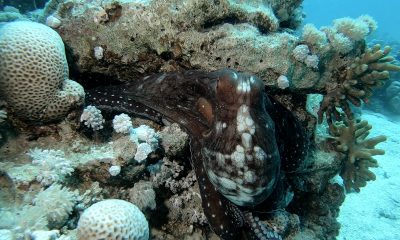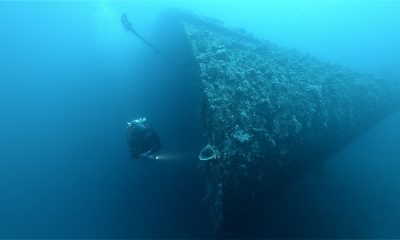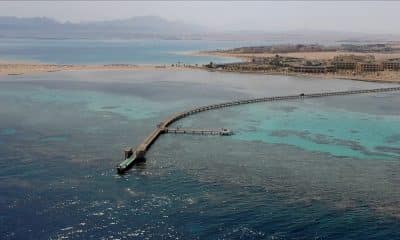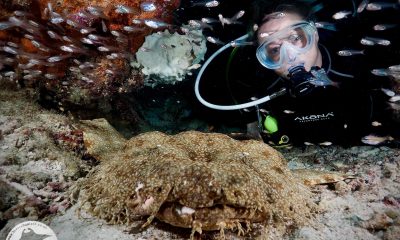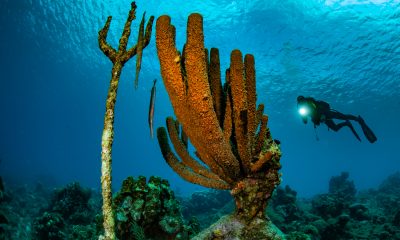Marine Life & Conservation
Is the tide turning in favour of sharks?
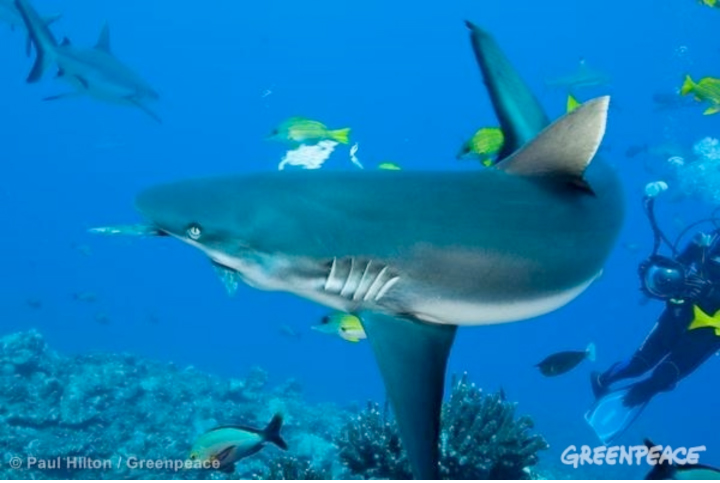
At the end of Shark Week, it’s time for some good news on sharks. Despite all the earlier blogs this week, this is not me trying to convince you sharks are huggable and loveable (though, they are, obviously), rather a round-up of some good conservation news for the world’s often-underappreciated shark species.
This year at the CITES (Convention on International Trade in Endangered Species) convention, countries agreed measures to limit the trade in a number of shark species. That means there is now greater control on several of the most threatened species: hammerheads, porbeagle, oceanic whitetips, as well as whale and basking sharks. Whilst this isn’t earth-shattering news, or full-blown protection it has been a hard-won victory to get any restrictions on the global trade in endangered sharks specifically (and fish in general!). So it’s great news for sharks that the global community seems to have turned a corner in agreeing that steps need to be taken. There is, of course, more to do…
And one of the most obvious things is to crack down on the horrendous practice of shark finning. Shark finning is when sharks are intentionally or ‘accidentally’ caught (often in the process of fishing for tuna), and just their fins are harvested. Sorry, ‘harvested’ sounds quite reasonable. Finning a shark is frankly no different than shooting a rhino or an elephant to hack off its horns or tusks … and the market is similarly for an entirely pointless and unnecessary product. Shark fin soup has celebratory status as a dish, but by all accounts is rather tasteless, in both senses of the word.
The good news on shark finning is that public perception is turning here too. The European Union recently agreed a ban on shark finning, meaning sharks, if caught, have to be landed with fins intact. That might not be enough for some of you, but it’s a huge step in stamping out the finning business. There is more to do here of course, especially on the issue of demand for shark fin soup. So it’s encouraging to see New York become the third US state to ban the sale of shark fins. Some haulage companies are turning away shark fin as a cargo too. This is sending a powerful message, that finning is increasingly unacceptable, but there is a long way to go. That’s why our colleagues in New Zealand for example are campaigning hard right now to get their country to be next on the list to consign shark finning to history.
These steps forward in regulating the trade of sharks is happening hand-in-hand with a growing awareness of sharks, and their place in the ecosystem. Around the world, previously feared or persecuted shark populations have become tourist attractions. Great whites provide a powerful spectacle off South Africa, whilst the sunny (no, really) isles of the Scottish Hebrides are one of the best places in the world to get up close with giant basking sharks. Whale sharks draw the tourists in the Philippines and Gulf of Mexico, whilst the waters of the Maldives offer up spectacular manta rays. Coral reefs in the tropics support an array of life, of course, but sharks are undoubted crowd-pleasers there too. Of course, these need to be developed carefully and considerately, as with all eco-tourism ventures, to have the minimum impact possible on the star turns.
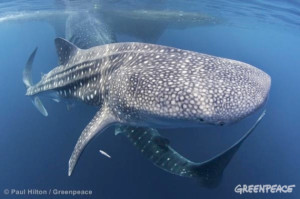 As sharks are being increasingly valued alive, some governments are seizing the opportunity to invest in them. That’s where marine reserves come in. Some shark species may be oceanic wanderers, but many have preferred feeding or breeding grounds that can be protected. Where sharks are protected, such as in the Chagos Archipelago, or seas around Fiji, the effects are plain to see – with scientists recording thriving shark populations in these oceanic sanctuaries.
As sharks are being increasingly valued alive, some governments are seizing the opportunity to invest in them. That’s where marine reserves come in. Some shark species may be oceanic wanderers, but many have preferred feeding or breeding grounds that can be protected. Where sharks are protected, such as in the Chagos Archipelago, or seas around Fiji, the effects are plain to see – with scientists recording thriving shark populations in these oceanic sanctuaries.
The future for sharks could be bright, but we need to do much more to help redress the balance of what we have done, and are still doing to them. If Shark Week has one take home message – it should be that.
Willie Mackenzie is an Oceans Campaigner at Greenpeace UK.
http://www.greenpeace.org/international/en/news/Blogs/makingwaves/shark-week/blog/46187/
Marine Life & Conservation
Leading UK-based shark conservation charity, the Shark Trust, is delighted to announce tour operator Diverse Travel as a Corporate Patron

 Corporate Patrons provide a valuable boost to the work of The Shark Trust. The Trust team works globally to safeguard the future of sharks, and their close cousins, the skates and rays, engaging with a global network of scientists, policymakers, conservation professionals, businesses and supporters to further shark conservation.
Corporate Patrons provide a valuable boost to the work of The Shark Trust. The Trust team works globally to safeguard the future of sharks, and their close cousins, the skates and rays, engaging with a global network of scientists, policymakers, conservation professionals, businesses and supporters to further shark conservation.
Specialist tour operator Diverse Travel has operated since 2014 and is committed to offering its guests high quality, sustainable scuba diving holidays worldwide. Working together with the Shark Trust will enable both organisations to widen engagement and encourage divers and snorkellers to actively get involved in shark conservation.
“Sharks are truly at the heart of every diver and at Diverse Travel, we absolutely share that passion. There is nothing like seeing a shark in the wild – it’s a moment that stays with you forever!” says Holly Bredin, Sales & Marketing Manager, Diverse Travel.
“We’re delighted to celebrate our 10th year of business by becoming a Corporate Patron of the Shark Trust. This is an exciting partnership for Diverse and our guests. We will be donating on behalf of every person who books a holiday with us to contribute towards their vital shark conservation initiatives around the world. We will also be working together with the Trust to inspire divers, snorkellers and other travellers to take an active role – at home and abroad – in citizen science projects and other activities.”
Paul Cox, CEO of The Shark Trust, said:
“It’s an exciting partnership and we’re thrilled to be working with Diverse Travel to enable more divers and travellers to get involved with sharks and shark conservation. Sharks face considerable conservation challenges but, through collaboration and collective action, we can secure a brighter future for sharks and their ocean home. This new partnership takes us one more valuable step towards that goal.”
For more information about the Shark Trust visit their website here.
For more about Diverse Travel click here.
Marine Life & Conservation
Shark Trust Asks Divers to help with Shark Sightings this Global Citizen Science Month

 Whether you are stuck for ideas of what to do with the kids or are off on the dive trip of your dreams. You can get involved in Citizen Science Month and help the Shark Trust by providing vital data about sharks are rays both close to home and further afield.
Whether you are stuck for ideas of what to do with the kids or are off on the dive trip of your dreams. You can get involved in Citizen Science Month and help the Shark Trust by providing vital data about sharks are rays both close to home and further afield.
In addition to reporting the sharks and rays you see on your dives, the eggcases you find on the beach, the Shark Trust is looking for some specific data from divers who are asked to report any Oceanic Whitetip and Basking Sharks.
Oceanic Whitetip Sharks
The Shark Trust are looking specifically for Oceanic Whitetip Shark sightings over the coming weeks and months. So, if you are diving anywhere in the world, please report your sightings via the website or app.
Website: https://recording.sharktrust.org/
App: Search The Shark Trust in your app store
The Oceanic Whitetip. Known for their incredibly long dorsal and pectoral fins, this species was once the most abundant oceanic-pelagic species of shark on the planet.
Large and stocky, they are grey or brown above, and white below and famous for their huge rounded first dorsal fin and paddle-like pectoral fins. The fins also highly prized within the shark fin trade. Whilst they are mostly solitary, Oceanic Whitetips do occasionally hunt in groups.
An inquisitive species, they were easy prey for fisheries. Combined with their low reproductive rate, they were inevitably at high risk of population depletion. And declines of up to 99% have been reported in certain sea areas. They are listed as Critically Endangered on the IUCN Redlist (2019).
Conservation efforts to discourage further declines include listing on CITES Appendix II and CMS Appendix I. They’re also the only species prohibited from take by all the Tuna RFMOs (Regional Fisheries Management Organisations). However, these measures do not mean that Oceanic Whitetips are not still caught – whether targeted or as bycatch – in some parts of the world. With populations declining at such a high rate, effective implementation of management measures is essential to ensure that the species can recover.
If you are lucky enough to get an image of an Oceanic Whitetip and you record your sighting on the Shark Trust app or website YOU CAN WIN! All images submitted with sightings, that also give consent to use in conservation messaging, will be in with a chance to win an Oceanic Whitetip T-shirt and mug. The competition will run until the end of “Shark Month” in July – so keep those sightings (and images) coming in.
Basking Sharks
Basking Shark (Cetorhinus maximus) season is upon us, and the Shark Trust is asking everyone to keep an eye out for these majestic giants over the summer months. If you see any, you can record your sighting to the Basking Shark Sightings database.
Each year, these mighty fish return to British waters to feed on plankton. You may see one, (or a few if you’re really lucky) from around April-October. They can be seen feeding at the surface of the water, where they look like they’re basking in the sun. Thus, their name!
Sighting hotspots around the British Isles include southwest England, Isle of Man, north coast of Ireland, and western Scotland. The Sea of the Hebrides is the most prolific sightings area in Scotland, but they have been spotted all around the coast and have even ventured into some of the sea lochs. The Shark Trust has received thousands of sightings since the Basking Shark project began, but more data is needed to truly understand what is going on with population numbers and distribution. You can help by recording your sightings this summer.
Great Eggcase Hunt
The Shark Trust has an Easter Egg Hunt with a difference for you to try. Take part in the Great Eggcase Hunt and get involved with a big citizen science project that helps shark, ray and skate conservation. And it’s an enjoyable activity for all the family.
The Shark Trust also want snorkellers and divers to record their underwater eggcase findings. Underwater records help pinpoint exactly where sharks and skates are laying their eggs and can help link to beach records. Learning the depth and substrate that they lay on also helps better understand the species.
Find out more: https://www.sharktrust.org/great-eggcase-hunt
Whether you are diving, snorkelling or exploring on the beach you can take part in Citizen Science Month and get actively involved in shark and ray conservation. Find out more: www.sharktrust.org
-

 News3 months ago
News3 months agoHone your underwater photography skills with Alphamarine Photography at Red Sea Diving Safari in March
-

 News2 months ago
News2 months agoCapturing Critters in Lembeh Underwater Photography Workshop 2024: Event Roundup
-

 Marine Life & Conservation Blogs2 months ago
Marine Life & Conservation Blogs2 months agoCreature Feature: Swell Sharks
-

 Blogs1 month ago
Blogs1 month agoMurex Resorts: Passport to Paradise!
-

 Gear News3 months ago
Gear News3 months agoBare X-Mission Drysuit: Ideal for Both Technical and Recreational Divers
-

 Blogs2 months ago
Blogs2 months agoDiver Discovering Whale Skeletons Beneath Ice Judged World’s Best Underwater Photograph
-

 Gear Reviews2 months ago
Gear Reviews2 months agoGear Review: Oceanic+ Dive Housing for iPhone
-
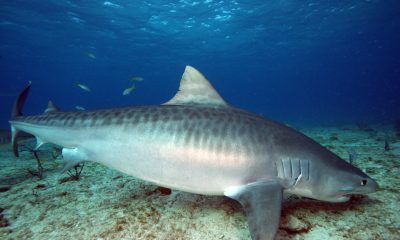
 Blogs3 months ago
Blogs3 months agoThe Thrilling Encounter with Tiger Sharks at Beqa Lagoon’s ‘The Colosseum’ with Coral Coast Divers



